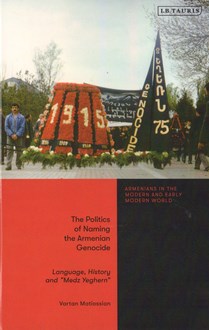The politics of naming the Armenian genocide : language, history and “Medz Yeghern“ / Vartan Matiossian
Yer Numarası
A.IX/5050
ISBN
9780755641086 (HB)
9780755641093 (ePDF)
9780755641109 (eBook)
9780755641093 (ePDF)
9780755641109 (eBook)
Dil Kodu
İngilizce
Eser Adının Farklı Biçimi
Language, history and “Medz Yeghern“
Yayın Bilgisi
London : I. B. Tauris, 2022.
Fiziksel Niteleme
xii, 279 sayfa ; 25 cm
Dizi
Armenians in the modern and early modern world
Genel Not
İndeks s. [269]-279.
Bibliyografi, vb. Notu
Bibliyografya s. [238]-268.
İçindekiler Notu
Introduction: Silencing the Name -- PART I. LANGUAGE AND HISTORY. Yeghern until the Late Nineteenth Century -- Yeghern before and after 1915 -- Medz Yeghern and “Genocide” in Armenia and the Diaspora – PART II. POLITICS AND LANGUAGE. John Paul II: “From the Depths of the Metz Yeghérn” -- Turkey: “The Denial of the Great Catastrophe” -- United States: “Genocide of the Armenians” and “Meds Yeghern” -- From Uruguay to the United States: on the words of recognition -- Conclusion: Unsilencing the Name.
Özet, vb.
“This book explores the genealogy of the concept of 'Medz Yeghern' ('Great Crime'), the Armenian term for the mass murder and ethnic cleansing of the Armenian ethno-religious group in the Ottoman Empire between the years 1915-1923. Widely accepted by historians as one of the classical cases of genocide in the 20th century, ascribing the right definition to the crime has been a source of contention and controversy in international politics. Vartan Matiossian here draws upon extensive research based on Armenian sources, neglected in much of the current historiography, as well as other European languages in order to trace the development of the concepts pertaining to mass killing and genocide of Armenians from the ancient to the modern periods. Beginning with an analysis of the term itself, he shows how the politics of its use evolved as Armenians struggled for international recognition of the crime after 1945, in the face of Turkish protest. Taking a combined historical, philological, literary and political perspective, the book is an insightful exploration of the politics of naming a catastrophic historical event, and the competitive nature of national collective memories“ -- Yayıncı.

 English
English

